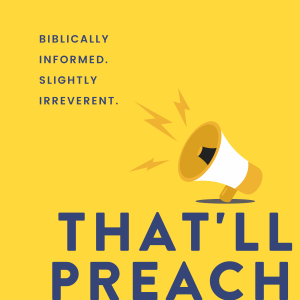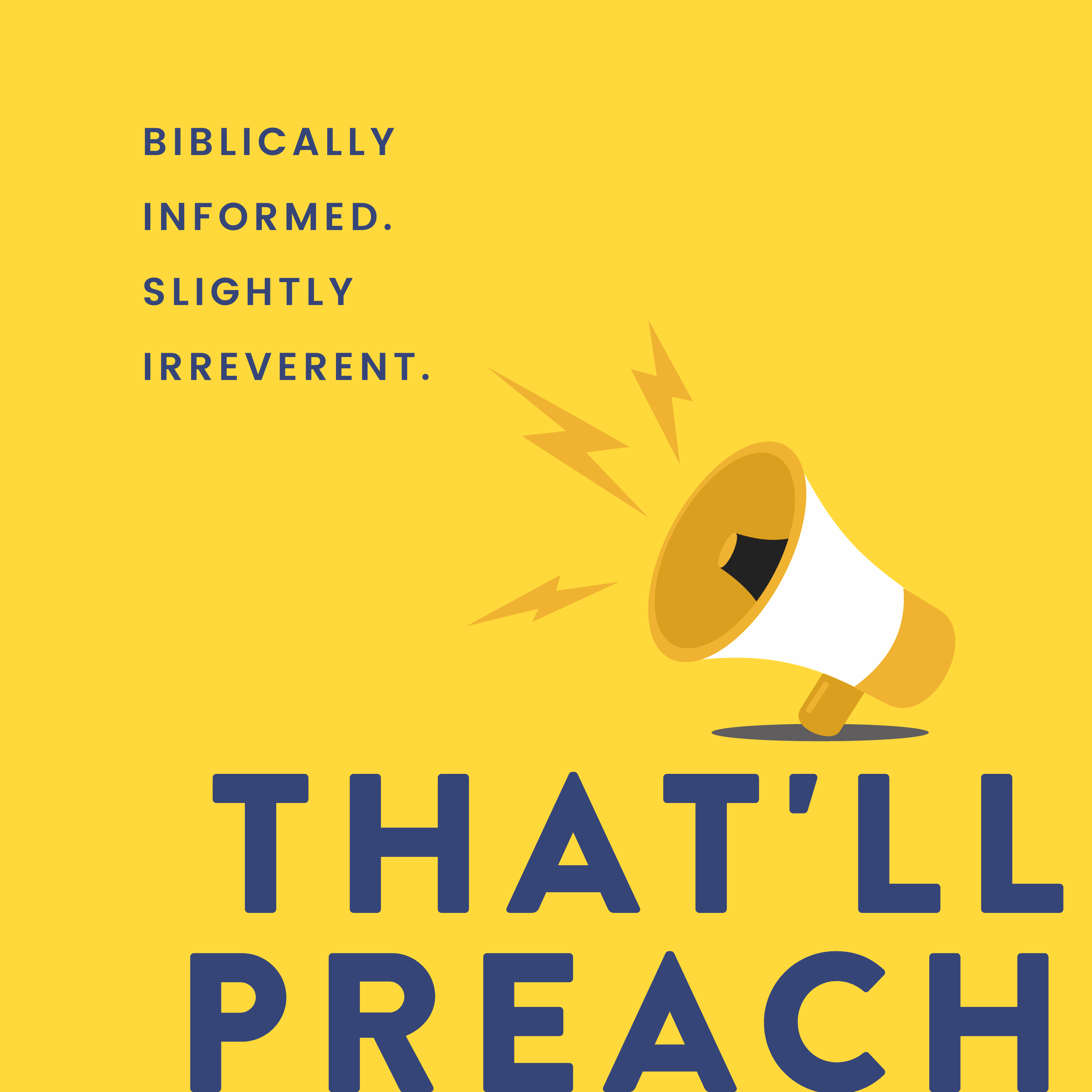Episodes

Wednesday Jan 17, 2024
Calvin on Contentment in Trials and Blessing (Reformation Series Ep.10)
Wednesday Jan 17, 2024
Wednesday Jan 17, 2024
How should Christians think about contentment in all situations of life. When times are good there’s a temptation to complacency. When times are difficult we struggle with despair and bitterness. Calvin encourages Christians to meditate on the fragility and temporary nature of life in order to cultivate eternal hope.
Website: thatllpreach.io
IG: @thatllpreachpodcast

Tuesday Jan 09, 2024
Tuesday Jan 09, 2024
Roman Catholics often critique the Protestant doctrine of Sola Scriptura because it devolves into subjectivity and ignores the witness of church history. In this episode, Sean Luke of Anglican Aesthetics challenges those critiques by looking at what both the Church Fathers and the Reformers actually believed. He also advocates for the position of “Sola Apostolica” as a way to demonstrate the Reformers as the true heirs of the Apostolic teaching. He also takes issue with Roman Catholic claims about doctrinal development, papal declarations about dogma, and the role of personal judgment. Finally, we end the conversation with a discussion on the future of Catholic-Protestant dialogue and a potential plan for reunification.
Show Notes
Check out Sean Luke’s YouTube channel “Anglican Aesthetics”
Listen to our interview with Onsi Kamel
Listen to our interview witih Dr. Michael Haykin
Support us on Patreon
Website: thatllpreach.io

Tuesday Dec 19, 2023
Calvin on Suffering and Trials (Reformation Series Ep.08)
Tuesday Dec 19, 2023
Tuesday Dec 19, 2023
We continue our series on John Calvin’s A Little Book on the Christian Life by looking at the Reformer’s insights on suffering and trials. We learn about the way suffering contributes to our salvation, forges in us the virtue of patience, and spurs us on toward greater joy.
Website: thatllpreach.io
IG: @thatllpreachpodcast

Wednesday Dec 13, 2023
How Catholicism Turned Me Protestant with Onsi Kamel (Reformation Series Ep.07)
Wednesday Dec 13, 2023
Wednesday Dec 13, 2023
Onsi Kamel joins us to talk about how his study of Roman Catholicism made him Protestant. In this episode we discuss the ways Roman Catholicism appealed to his need for certainty and hunger for historical rootedness. He also talks candidly about the influence of the famous Anglican-turned-Roman Catholic theologian John Henry Newman. He shares ways Newman challenged his thinking as well as ways he found the theologians conclusions unsatisfying. Onsi also speaks on the future of ecumenical dialogue and the importance of engaging with the Reformers.
Show Notes
Catholicism Made Me Protestant by Onsi Kamel
Onsi Kamel on Conversion to Catholicism with Alastair Roberts
Support us on Patreon
Website: thatllpreach.io

Wednesday Dec 06, 2023
Calvin’s Cure for Cage Stage Calvinists (Reformation Series Ep.06)
Wednesday Dec 06, 2023
Wednesday Dec 06, 2023
Do you or someone you love suffer from “Cage-Stage Calvinism?” We have the antidote from the original Calvinist himself, John Calvin. In this episode we look at the first two chapters of his classic work A Little Book on the Christian Life to hear practical and pastoral advice from Calvin on connecting doctrine to life, loving self-sacrificially, and living generously with our money. Our hope is that through this episode you’ll see Calvin for who he truly is: not an ivory tower theologians concerned only with abstract notions of predestination and election, but a pastor and shepherd of people striving to live godly lives. He encourages us to celebrate small wins, persevere through trials, and worship God with all our being.
Website: thatllpreach.io
IG: @thatllpreachpodcast

Thursday Nov 30, 2023
Podcast Recap: Chris Castaldo on Why Do Protestants Become Catholic?
Thursday Nov 30, 2023
Thursday Nov 30, 2023
This is the first episode of a new segment called “Podcast Recap” which summarizes key points of guest interviews in a distilled and accessible way. This episode look at the main points of an interview with Chris Castaldo on Why Protestants Become Catholics. Check out the full podcast episode here
Visit our website: thatllpreach.io
Follow us on Instagram: @thatllpreachpodcast

Tuesday Nov 28, 2023
Tuesday Nov 28, 2023
Dr. Matt Hoskin of the Davenant Institute joins the show to talk about how Protestants can benefit from the Desert Fathers. The Desert Fathers left civilization in order to seek God with a single mind. They fasted, took vows of celibacy, and fought the occasional demon. Our modern eyes look at the Desert Fathers with cynicism, but that betrays a lack of understanding on our part of the spiritual realities that constantly surround us. Dr. Hoskin encourages us to see the wisdom of the Desert Fathers especially in an age of technological distractions. They may provide the key to waking us up from our own spiritual apathy toward a life dedicated to God.
Show Notes
Davenant Hall Facultly Spotlight: Dr. Matthew Hoskin
Check out Dr. Hoskin’s Podcast: Devotion to Christ

Wednesday Nov 22, 2023
Why Do Protestants Become Catholic? with Chris Castaldo (Reformation Series Ep.04)
Wednesday Nov 22, 2023
Wednesday Nov 22, 2023
Pastor Chris Castaldo of New Covenant Church, Naperville joins us to talk about reasons why Protestants convert to Roman Catholicism. In this episode we discuss the psychological, theological, and sociological factors that compel Protestants to “cross the Tiber” to Rome as well as the ways the Protestant tradition fills those needs. Chris draws upon decades of writing about and dialoguing with Catholics to help Protestants minister to converts out of Catholicism as well as those desiring to become Catholic.
Show Notes
Visit Chris Castaldo’s Website
Talking with Catholics About the Gospel by Chris Castaldo
The Upside Down Kingdom: Wisdom for Life From the Beatitudes by Chris Castaldo
Why Do Protestants Convert? by Brad Littlejohn and Chris Castaldo
Website: thatllpreach.io
Instagram: @thatllpreachpodcast

Tuesday Nov 14, 2023
How the Reformation Began (Reformation Series Ep.03)
Tuesday Nov 14, 2023
Tuesday Nov 14, 2023
In this episode we discuss Martin Luther’s theological breakthrough that set the stage for the Reformation. He did not set out to start a movement, but rather wanted to debate with integrity and honesty the malpractice of the Roman Catholic church. This desire led him down a path that pit him against the Catholic church, the Pope, and the Holy Roman Emperor himself. Luther’s breakthrough reverberates through history until this day. Join us as we talk about his life, theology, and famous insults.
Website: thatllpreach.io
Instagram: @thatllpreachpodcast
Show Notes
Luther’s Reformation Breakthrough by Ryan Reeves
The Real Difference Between Catholics and Protestants with Guillaume Bignon
Still Protesting: Why the Reformation Still Matters by D.G. Hart
Reformation as Renewal by Matthew Barrett

Tuesday Nov 07, 2023
Tuesday Nov 07, 2023
John Henry Newman once remarked that, “To be deep in history is to cease to be Protestant.” Dr. Michael Haykin of Southern Seminary disagrees. Join us for a fascinating conversation on what Church Fathers like Cyprian, Athanasius, Augustine, Ignatius, Irenaeus, Clement, and others thought about baptism, the Lord’s Supper, and polity. We also talk about common misconceptions about the Church Fathers and why their example of deep theological reflection an earnest pursuit of holiness provide a model of faithfulness for Christians in a secular world. We also discuss whether John MacArthur is a Bishop and why Presbyterians are wrong about infant baptism!
Website: thatllpreach.io
Instagram: @thatllpreachpodcast
Show Notes
Rediscovering the Church Fathers by Dr. Michael Haykin

